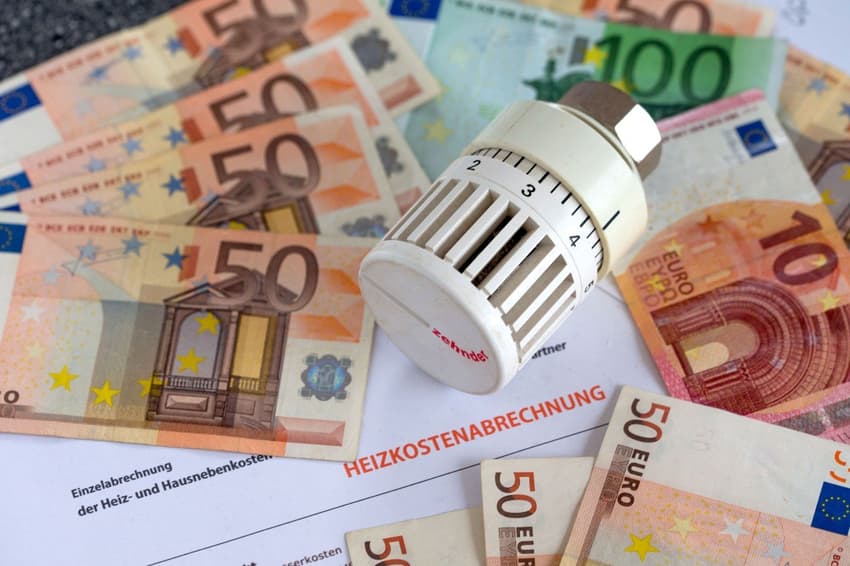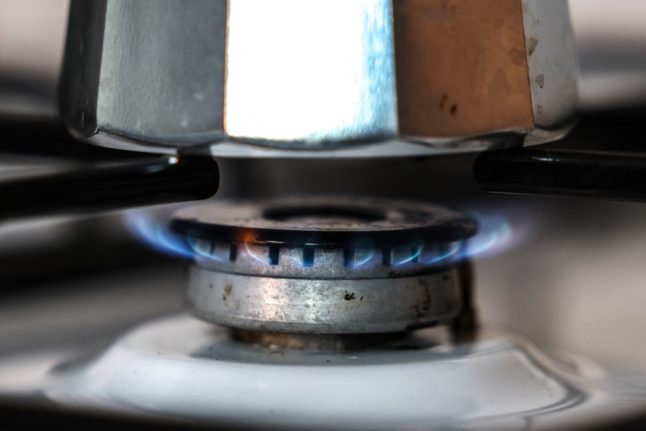What will happen to gas and electricity prices this winter in Germany?

After months of soaring energy prices last year in Germany, many are looking ahead to winter with trepidation. But are gas and electricity prices likely to skyrocket again - and what help can households expect?
It may have been an unusually warm start to autumn, but as we enter October, there seems to be a distinct chill in the air. Shorter, darker days and dropping temperatures mean that many households in Germany will be wondering when's best to turn their heating on - and what it will cost them if they do.
After Russia launched its full-scale invasion of Ukraine back in February 2022, the price of fossil fuels like gas and oil skyrocketed, putting an enormous strain on ordinary households and driving up the price of goods.
This year, after a much calmer spell, there are early signs that energy prices are on the rise again. And with the government's energy price cap due to expire at the end of the year, there are also calls for the state to do more to protect households from the squeeze.
What's going on with energy prices at the moment?
After shock price hikes in 2022, energy prices remained high in the first half of the year, according to the Federal Office of Statistics.
Private customers paid an average of 12.26 cents per kilowatt hour for natural gas and 42.29 cents per kilowatt hour for electricity in the first six months of 2023, the statisticians report. That amounts to an increase of 31.3 percent in gas prices and 21 percent in electricity prices compared to the second half of 2022.
Despite inflation easing to an estimated 4.5 percent in September - the lowest it's been since October 2021 - there continues to be a distinct upwards trend in one important household commodity: electricity.
Electricity prices increased by 16 percent in August. After a period of calm in which new customers could snap up better prices, people switching from old to new contracts are getting less attractive deals, with most tariffs set at around 30.4 cents per kilowatt hour. The average price for a kilowatt hour of electricity - including for existing customers - is around 39 cents.
One major reason for this is the spiralling gas prices, which influence the electricity prices in Germany due the way electricity is produced. Back in August, gas prices shot up from around €25 to €45 per megawatt hour and continue to hover around the €35 mark. However, they still remain well under the record highs of last year: in September 2022, a kilowatt hour of gas cost an astounding 21.75 cents, while in September 2023, the same amount of energy cost around 12.18 cents.
READ ALSO: Why people in Germany are being advised to switch energy suppliers
Are they likely to rise this winter?
Though nobody has a crystal ball, the ongoing shortages of fossil fuels on the market could lead to prices rising again significantly this winter.
The head of the International Energy Agency (IEA), Fatih Birol, recently warned that certain factors could lead to a massive spike in costs for households.
"In a scenario where the Chinese economy is very strong and buys a lot of liquefied natural gas from the markets and there is a cold winter, we could see upward pressure on natural gas prices," Birol told the BBC.
If this happens, consumers could once again be under pressure to conserve energy as much as possible, for example by turning the heating on later in the season or taking fewer hot showers.

An energy saving shower-head. Photo: picture alliance/dpa | Hauke-Christian Dittrich
READ ALSO: OPINION: A winter energy crunch in Europe looks a distinct possibility
However, consumers in Germany can expect to have some protection from rising prices thanks to the government's ongoing cap on gas and electricity prices.
Under the so-called 'Energiepreisbremse' - energy price break - gas prices for small businesses and private households are capped at 12 cents per kilowatt hour, while electricity prices are capped at 40 cents per kilowatt hour.
However, there's also an onus on households to save energy, as the cap only applies to 80 percent of your ordinary annual energy usage. Beyond this, consumers pay current market prices.
When will the energy price caps come to an end?
Despite recent comments by Economics Minister Robert Habeck suggesting that the gas and electricity price caps could be extended until spring next year, the relief measure is still due to end at the end of the year.
"The price brakes act like an insurance against rising prices," the Greens politician told the Augsburger Allgemeine newspaper back in July. "I advocate that we extend them again, until the end of winter - or to be more precise, until Easter."
Finance Minister Christian Lindner (FDP) allegedly supported this move, but in exchange would like to see VAT on natural gas hiked back up from seven to 19 percent at the start of the year - three months earlier than planned.
With the two ministers at a deadline, the issue of the price caps appears to have been sidelined, meaning consumers could once again be at the mercy of market forces in January and February, when the heating season is at its peak.
READ ALSO: Germany looks to extend energy price cap until April 2024
Could there be more relief for households?
There is one additional move by the government that could offer relief to households - but it's unclear if this will simply serve to line energy companies' pockets instead.
Since October 1st, two levies that make up part of the gas price for household customers have been eliminated for gas suppliers: the balancing energy levy and conversion levy. The balancing energy levy is designed to counteract fluctuations in the cost of procuring energy at short notice and the conversation levy covers the cost of converting different types of gas into gas that can be used by households. These two levies are normally passed onto consumers by the energy companies.
Until now, 0.57 cents per kilowatt hour was due for the so-called balancing energy levy, while the so-called conversion levy was set at 0.038 cents per kilowatt hour. Both will now be reduced to zero cents for an initial period of one year. For a household that uses 20,000 kilowatt-hours of energy per year, this amounts to a total saving of €121.60 - provided the full savings are passed on immediately.

A gas hob. Photo: Charly TRIBALLEAU / AFP
Speaking to DPA on Wednesday, Consumer Affairs Minister Steffi Lemke urged gas companies to cut prices for customers immediately.
"For low-income households in particular, this can provide considerable relief on energy costs," Lemke said. "Consumers should not have to wait until their next annual price calculation to see savings."
However, it is still unclear whether consumers will ultimately receive a reduction from suppliers - and if so, when this will be.
"The suppliers do not have to pass on this change to the customers immediately, but only in the next price calculation," confirmed a spokeswoman for the German Association of Energy and Water Industries.
Comments
See Also
It may have been an unusually warm start to autumn, but as we enter October, there seems to be a distinct chill in the air. Shorter, darker days and dropping temperatures mean that many households in Germany will be wondering when's best to turn their heating on - and what it will cost them if they do.
After Russia launched its full-scale invasion of Ukraine back in February 2022, the price of fossil fuels like gas and oil skyrocketed, putting an enormous strain on ordinary households and driving up the price of goods.
This year, after a much calmer spell, there are early signs that energy prices are on the rise again. And with the government's energy price cap due to expire at the end of the year, there are also calls for the state to do more to protect households from the squeeze.
What's going on with energy prices at the moment?
After shock price hikes in 2022, energy prices remained high in the first half of the year, according to the Federal Office of Statistics.
Private customers paid an average of 12.26 cents per kilowatt hour for natural gas and 42.29 cents per kilowatt hour for electricity in the first six months of 2023, the statisticians report. That amounts to an increase of 31.3 percent in gas prices and 21 percent in electricity prices compared to the second half of 2022.
Despite inflation easing to an estimated 4.5 percent in September - the lowest it's been since October 2021 - there continues to be a distinct upwards trend in one important household commodity: electricity.
Electricity prices increased by 16 percent in August. After a period of calm in which new customers could snap up better prices, people switching from old to new contracts are getting less attractive deals, with most tariffs set at around 30.4 cents per kilowatt hour. The average price for a kilowatt hour of electricity - including for existing customers - is around 39 cents.
One major reason for this is the spiralling gas prices, which influence the electricity prices in Germany due the way electricity is produced. Back in August, gas prices shot up from around €25 to €45 per megawatt hour and continue to hover around the €35 mark. However, they still remain well under the record highs of last year: in September 2022, a kilowatt hour of gas cost an astounding 21.75 cents, while in September 2023, the same amount of energy cost around 12.18 cents.
READ ALSO: Why people in Germany are being advised to switch energy suppliers
Are they likely to rise this winter?
Though nobody has a crystal ball, the ongoing shortages of fossil fuels on the market could lead to prices rising again significantly this winter.
The head of the International Energy Agency (IEA), Fatih Birol, recently warned that certain factors could lead to a massive spike in costs for households.
"In a scenario where the Chinese economy is very strong and buys a lot of liquefied natural gas from the markets and there is a cold winter, we could see upward pressure on natural gas prices," Birol told the BBC.
If this happens, consumers could once again be under pressure to conserve energy as much as possible, for example by turning the heating on later in the season or taking fewer hot showers.

READ ALSO: OPINION: A winter energy crunch in Europe looks a distinct possibility
However, consumers in Germany can expect to have some protection from rising prices thanks to the government's ongoing cap on gas and electricity prices.
Under the so-called 'Energiepreisbremse' - energy price break - gas prices for small businesses and private households are capped at 12 cents per kilowatt hour, while electricity prices are capped at 40 cents per kilowatt hour.
However, there's also an onus on households to save energy, as the cap only applies to 80 percent of your ordinary annual energy usage. Beyond this, consumers pay current market prices.
When will the energy price caps come to an end?
Despite recent comments by Economics Minister Robert Habeck suggesting that the gas and electricity price caps could be extended until spring next year, the relief measure is still due to end at the end of the year.
"The price brakes act like an insurance against rising prices," the Greens politician told the Augsburger Allgemeine newspaper back in July. "I advocate that we extend them again, until the end of winter - or to be more precise, until Easter."
Finance Minister Christian Lindner (FDP) allegedly supported this move, but in exchange would like to see VAT on natural gas hiked back up from seven to 19 percent at the start of the year - three months earlier than planned.
With the two ministers at a deadline, the issue of the price caps appears to have been sidelined, meaning consumers could once again be at the mercy of market forces in January and February, when the heating season is at its peak.
READ ALSO: Germany looks to extend energy price cap until April 2024
Could there be more relief for households?
There is one additional move by the government that could offer relief to households - but it's unclear if this will simply serve to line energy companies' pockets instead.
Since October 1st, two levies that make up part of the gas price for household customers have been eliminated for gas suppliers: the balancing energy levy and conversion levy. The balancing energy levy is designed to counteract fluctuations in the cost of procuring energy at short notice and the conversation levy covers the cost of converting different types of gas into gas that can be used by households. These two levies are normally passed onto consumers by the energy companies.
Until now, 0.57 cents per kilowatt hour was due for the so-called balancing energy levy, while the so-called conversion levy was set at 0.038 cents per kilowatt hour. Both will now be reduced to zero cents for an initial period of one year. For a household that uses 20,000 kilowatt-hours of energy per year, this amounts to a total saving of €121.60 - provided the full savings are passed on immediately.

Speaking to DPA on Wednesday, Consumer Affairs Minister Steffi Lemke urged gas companies to cut prices for customers immediately.
"For low-income households in particular, this can provide considerable relief on energy costs," Lemke said. "Consumers should not have to wait until their next annual price calculation to see savings."
However, it is still unclear whether consumers will ultimately receive a reduction from suppliers - and if so, when this will be.
"The suppliers do not have to pass on this change to the customers immediately, but only in the next price calculation," confirmed a spokeswoman for the German Association of Energy and Water Industries.
Join the conversation in our comments section below. Share your own views and experience and if you have a question or suggestion for our journalists then email us at [email protected].
Please keep comments civil, constructive and on topic – and make sure to read our terms of use before getting involved.
Please log in here to leave a comment.